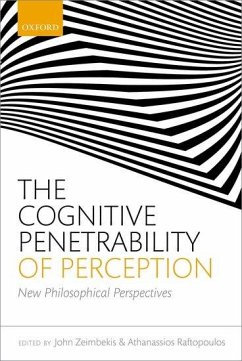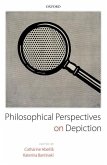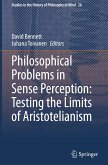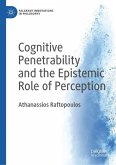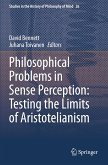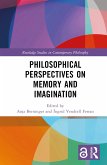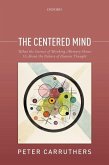The Cognitive Penetrability of Perception: New Philosophical Perspectives
Herausgeber: Zeimbekis, John; Raftopoulos, Athanassios
The Cognitive Penetrability of Perception: New Philosophical Perspectives
Herausgeber: Zeimbekis, John; Raftopoulos, Athanassios
- Gebundenes Buch
- Merkliste
- Auf die Merkliste
- Bewerten Bewerten
- Teilen
- Produkt teilen
- Produkterinnerung
- Produkterinnerung
A team of leading experts elucidate the nature of the cognitive penetrability hypothesis, according to which our beliefs, desires, and emotions literally affect how we see the world. They connect the topic's multiple and interdisciplinary strands, and reveal the importance of knowing whether and how cognitive states can influence perception.
Andere Kunden interessierten sich auch für
![Aquinas's Theory of Perception: An Analytic Reconstruction Aquinas's Theory of Perception: An Analytic Reconstruction]() Anthony J. LisskaAquinas's Theory of Perception: An Analytic Reconstruction134,99 €
Anthony J. LisskaAquinas's Theory of Perception: An Analytic Reconstruction134,99 €![Philosophical Perspectives on Depiction Philosophical Perspectives on Depiction]() Catharine AbellPhilosophical Perspectives on Depiction118,99 €
Catharine AbellPhilosophical Perspectives on Depiction118,99 €![Philosophical Problems in Sense Perception: Testing the Limits of Aristotelianism Philosophical Problems in Sense Perception: Testing the Limits of Aristotelianism]() Philosophical Problems in Sense Perception: Testing the Limits of Aristotelianism117,69 €
Philosophical Problems in Sense Perception: Testing the Limits of Aristotelianism117,69 €![Cognitive Penetrability and the Epistemic Role of Perception Cognitive Penetrability and the Epistemic Role of Perception]() Athanassios RaftopoulosCognitive Penetrability and the Epistemic Role of Perception55,99 €
Athanassios RaftopoulosCognitive Penetrability and the Epistemic Role of Perception55,99 €![Philosophical Problems in Sense Perception: Testing the Limits of Aristotelianism Philosophical Problems in Sense Perception: Testing the Limits of Aristotelianism]() Philosophical Problems in Sense Perception: Testing the Limits of Aristotelianism81,99 €
Philosophical Problems in Sense Perception: Testing the Limits of Aristotelianism81,99 €![Philosophical Perspectives on Memory and Imagination Philosophical Perspectives on Memory and Imagination]() Philosophical Perspectives on Memory and Imagination170,99 €
Philosophical Perspectives on Memory and Imagination170,99 €![The Centered Mind: What the Science of Working Memory Shows Us about the Nature of Human Thought The Centered Mind: What the Science of Working Memory Shows Us about the Nature of Human Thought]() Peter CarruthersThe Centered Mind: What the Science of Working Memory Shows Us about the Nature of Human Thought68,99 €
Peter CarruthersThe Centered Mind: What the Science of Working Memory Shows Us about the Nature of Human Thought68,99 €-
-
-
A team of leading experts elucidate the nature of the cognitive penetrability hypothesis, according to which our beliefs, desires, and emotions literally affect how we see the world. They connect the topic's multiple and interdisciplinary strands, and reveal the importance of knowing whether and how cognitive states can influence perception.
Produktdetails
- Produktdetails
- Verlag: Oxford University Press, USA
- Seitenzahl: 376
- Erscheinungstermin: 6. Oktober 2015
- Englisch
- Abmessung: 236mm x 155mm x 33mm
- Gewicht: 816g
- ISBN-13: 9780198738916
- ISBN-10: 0198738919
- Artikelnr.: 47867391
- Verlag: Oxford University Press, USA
- Seitenzahl: 376
- Erscheinungstermin: 6. Oktober 2015
- Englisch
- Abmessung: 236mm x 155mm x 33mm
- Gewicht: 816g
- ISBN-13: 9780198738916
- ISBN-10: 0198738919
- Artikelnr.: 47867391
John Zeimbekis is Assistant Professor of Philosophy at the University of Patras. He works on the philosophy of perception, especially demonstrative thought, the metaphysics of qualities, and the relations between thought, perception, imagery, memory, and pictures. He has published papers on perception in Noûs and Philosophical Studies. He also works on topics in aesthetics and is the author of a book on aesthetic value, Qu'est-ce qu'un Jugement Esthétique (Paris, Vrin, 2006). Athanassios Raftopoulos is Professor of Epistemology and Cognitive Science in the Department of Psychology at the University of Cyprus. He is the author of Cognition and Perception: How Do Psychology and Neural Sciences Inform Philosophy (MIT, 2009), and co-author with Philippos Kargopoulos of The Science of Logic and the Art of Thinking (Equinox, 1999). He is editor of Cognitive Penetrability of Perception: Attention, Action, Planning, and Bottom-up Constraints (Nova Science, 2005), co-editor of Perception, Realism, and the Problem of Reference (CUP, 2012), and of Cognitive Developmental Change: Theories, Models and Measurement (CUP, 2004). Raftopoulos has published over one hundred papers on the philosophy of science, cognitive science, perception, epistemology, and philosophy of mind.
* The Cognitive Penetrability of Perception: An Overview
* I. DEFINITIONAL AND METHODOLOGICAL ISSUES
* 1: Edouard Machery: Cognitive Penetrability: A No-Progress Report
* 2: Dustin Stokes: Towards a Consequentialist Understanding of
Cognitive Penetration
* II. MODULARITY, ENCAPSULATION AND IMPENETRABILITY
* 3: Jack C. Lyons: Unencapsulated Modules and Perceptual Judgment
* 4: Daniel Burnston and Jonathan Cohen: Perceptual Integration,
Modularity, and Cognitive Penetration
* 5: Ophelia Deroy: Multisensory Perception and Cognitive Penetration:
The Unity Assumption, Thirty Years After
* III. SUBSTANTIVE IMPENETRABILITY AND PENETRABILITY CLAIMS
* 6: Fred Dretske: Perception versus Conception: The Goldilocks Test
* 7: Robert Briscoe: Cognitive Penetration and the Reach of Phenomenal
Content
* 8: Brad Mahon and Wayne Wu: Cognitive Penetration of the Dorsal
Visual Stream?
* 9: Christopher Mole: Attention and Cognitive Penetration
* IV. COGNITIVE PENETRABILITY AND THE PHENOMENOLOGY OF PERCEPTION
* 10: Jérôme Dokic and Jean-Rémy Martin: Looks the same but feels
different: A metacognitive approach to cognitive penetrability
* 11: Athanassios Raftopoulos: Cognitive Penetrability and
Consciousness
* 12: John Zeimbekis: Seeing, Visualizing, and Believing: Pictures and
Cognitive Penetration
* V. COGNITIVE PENETRABILITY AND NONCONCEPTUAL CONTENT
* 13: Fiona Macpherson: Cognitive Penetration and Nonconceptual Content
* VI. COGNITIVE PENETRABILITY AND REALISM
* 14: Jonathan Lowe: Perceptual Content, Cognitive Penetrability, and
Realism
* 15: Costas Pagondiotis: Cognitive (Im)penetrability of Vision:
Restricting Vision versus Restricting Cognition
* Afterword: Epistemic Evaluability and Perceptual Farce
* Index
* I. DEFINITIONAL AND METHODOLOGICAL ISSUES
* 1: Edouard Machery: Cognitive Penetrability: A No-Progress Report
* 2: Dustin Stokes: Towards a Consequentialist Understanding of
Cognitive Penetration
* II. MODULARITY, ENCAPSULATION AND IMPENETRABILITY
* 3: Jack C. Lyons: Unencapsulated Modules and Perceptual Judgment
* 4: Daniel Burnston and Jonathan Cohen: Perceptual Integration,
Modularity, and Cognitive Penetration
* 5: Ophelia Deroy: Multisensory Perception and Cognitive Penetration:
The Unity Assumption, Thirty Years After
* III. SUBSTANTIVE IMPENETRABILITY AND PENETRABILITY CLAIMS
* 6: Fred Dretske: Perception versus Conception: The Goldilocks Test
* 7: Robert Briscoe: Cognitive Penetration and the Reach of Phenomenal
Content
* 8: Brad Mahon and Wayne Wu: Cognitive Penetration of the Dorsal
Visual Stream?
* 9: Christopher Mole: Attention and Cognitive Penetration
* IV. COGNITIVE PENETRABILITY AND THE PHENOMENOLOGY OF PERCEPTION
* 10: Jérôme Dokic and Jean-Rémy Martin: Looks the same but feels
different: A metacognitive approach to cognitive penetrability
* 11: Athanassios Raftopoulos: Cognitive Penetrability and
Consciousness
* 12: John Zeimbekis: Seeing, Visualizing, and Believing: Pictures and
Cognitive Penetration
* V. COGNITIVE PENETRABILITY AND NONCONCEPTUAL CONTENT
* 13: Fiona Macpherson: Cognitive Penetration and Nonconceptual Content
* VI. COGNITIVE PENETRABILITY AND REALISM
* 14: Jonathan Lowe: Perceptual Content, Cognitive Penetrability, and
Realism
* 15: Costas Pagondiotis: Cognitive (Im)penetrability of Vision:
Restricting Vision versus Restricting Cognition
* Afterword: Epistemic Evaluability and Perceptual Farce
* Index
* The Cognitive Penetrability of Perception: An Overview
* I. DEFINITIONAL AND METHODOLOGICAL ISSUES
* 1: Edouard Machery: Cognitive Penetrability: A No-Progress Report
* 2: Dustin Stokes: Towards a Consequentialist Understanding of
Cognitive Penetration
* II. MODULARITY, ENCAPSULATION AND IMPENETRABILITY
* 3: Jack C. Lyons: Unencapsulated Modules and Perceptual Judgment
* 4: Daniel Burnston and Jonathan Cohen: Perceptual Integration,
Modularity, and Cognitive Penetration
* 5: Ophelia Deroy: Multisensory Perception and Cognitive Penetration:
The Unity Assumption, Thirty Years After
* III. SUBSTANTIVE IMPENETRABILITY AND PENETRABILITY CLAIMS
* 6: Fred Dretske: Perception versus Conception: The Goldilocks Test
* 7: Robert Briscoe: Cognitive Penetration and the Reach of Phenomenal
Content
* 8: Brad Mahon and Wayne Wu: Cognitive Penetration of the Dorsal
Visual Stream?
* 9: Christopher Mole: Attention and Cognitive Penetration
* IV. COGNITIVE PENETRABILITY AND THE PHENOMENOLOGY OF PERCEPTION
* 10: Jérôme Dokic and Jean-Rémy Martin: Looks the same but feels
different: A metacognitive approach to cognitive penetrability
* 11: Athanassios Raftopoulos: Cognitive Penetrability and
Consciousness
* 12: John Zeimbekis: Seeing, Visualizing, and Believing: Pictures and
Cognitive Penetration
* V. COGNITIVE PENETRABILITY AND NONCONCEPTUAL CONTENT
* 13: Fiona Macpherson: Cognitive Penetration and Nonconceptual Content
* VI. COGNITIVE PENETRABILITY AND REALISM
* 14: Jonathan Lowe: Perceptual Content, Cognitive Penetrability, and
Realism
* 15: Costas Pagondiotis: Cognitive (Im)penetrability of Vision:
Restricting Vision versus Restricting Cognition
* Afterword: Epistemic Evaluability and Perceptual Farce
* Index
* I. DEFINITIONAL AND METHODOLOGICAL ISSUES
* 1: Edouard Machery: Cognitive Penetrability: A No-Progress Report
* 2: Dustin Stokes: Towards a Consequentialist Understanding of
Cognitive Penetration
* II. MODULARITY, ENCAPSULATION AND IMPENETRABILITY
* 3: Jack C. Lyons: Unencapsulated Modules and Perceptual Judgment
* 4: Daniel Burnston and Jonathan Cohen: Perceptual Integration,
Modularity, and Cognitive Penetration
* 5: Ophelia Deroy: Multisensory Perception and Cognitive Penetration:
The Unity Assumption, Thirty Years After
* III. SUBSTANTIVE IMPENETRABILITY AND PENETRABILITY CLAIMS
* 6: Fred Dretske: Perception versus Conception: The Goldilocks Test
* 7: Robert Briscoe: Cognitive Penetration and the Reach of Phenomenal
Content
* 8: Brad Mahon and Wayne Wu: Cognitive Penetration of the Dorsal
Visual Stream?
* 9: Christopher Mole: Attention and Cognitive Penetration
* IV. COGNITIVE PENETRABILITY AND THE PHENOMENOLOGY OF PERCEPTION
* 10: Jérôme Dokic and Jean-Rémy Martin: Looks the same but feels
different: A metacognitive approach to cognitive penetrability
* 11: Athanassios Raftopoulos: Cognitive Penetrability and
Consciousness
* 12: John Zeimbekis: Seeing, Visualizing, and Believing: Pictures and
Cognitive Penetration
* V. COGNITIVE PENETRABILITY AND NONCONCEPTUAL CONTENT
* 13: Fiona Macpherson: Cognitive Penetration and Nonconceptual Content
* VI. COGNITIVE PENETRABILITY AND REALISM
* 14: Jonathan Lowe: Perceptual Content, Cognitive Penetrability, and
Realism
* 15: Costas Pagondiotis: Cognitive (Im)penetrability of Vision:
Restricting Vision versus Restricting Cognition
* Afterword: Epistemic Evaluability and Perceptual Farce
* Index

